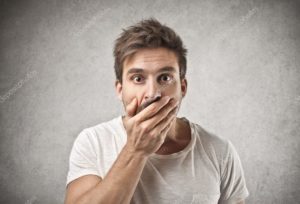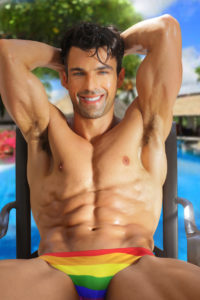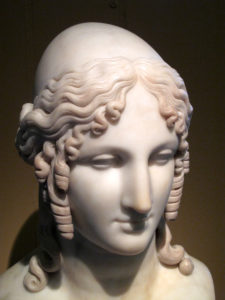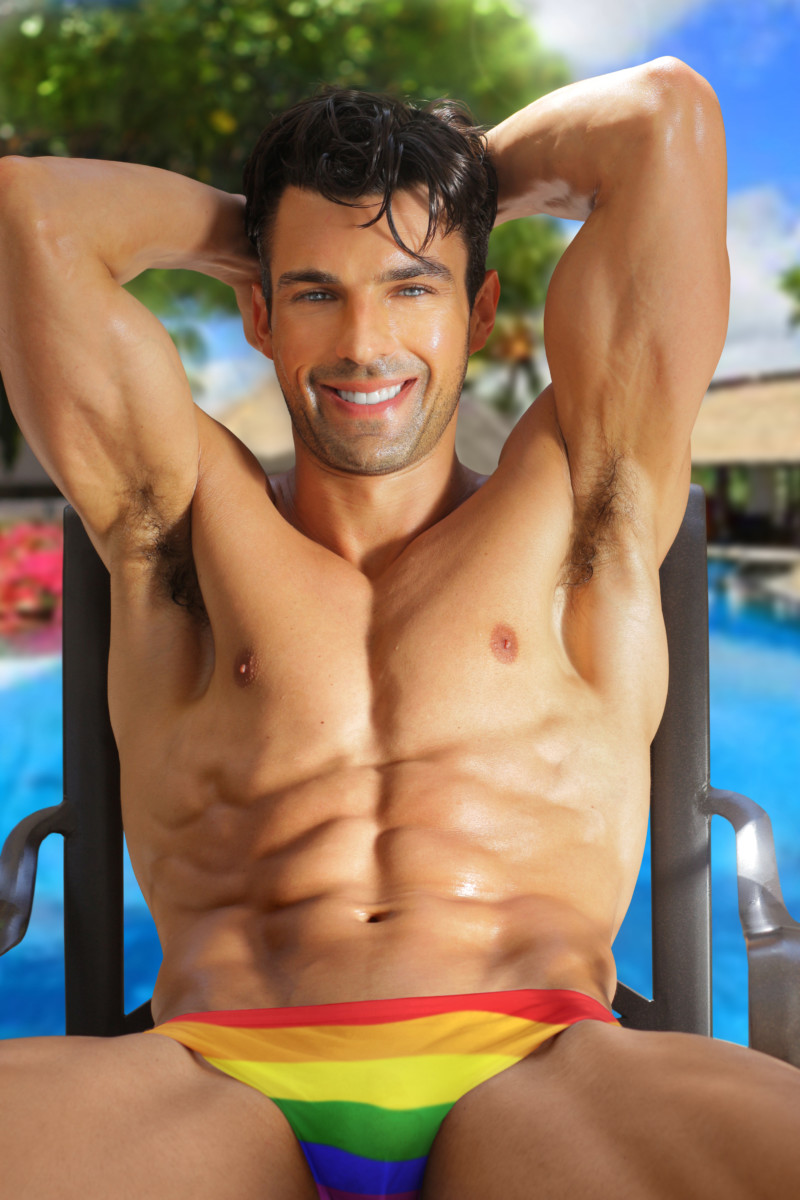 Gay Men and Appearance Privilege: What It Is, What To Do About It
Gay Men and Appearance Privilege: What It Is, What To Do About It
Imitation and Flattery?
Recently, I discovered that a gay men’s specialist therapist in Chicago had posted a string of postings in recent months on Facebook that directly coincided with a string of topics of several of my blog articles and podcast episodes from Fall, 2018. They say “imitation is the sincerest form of flattery”, but I object to my competitors using my material and unique discussion topics as “inspiration” for their own without giving me credit. Only I would be able to spot the “more than by chance” similarities, and this has been done before by a gay male therapist in San Francisco (with “contractees” in other cities), as well as staff writers on websites like Queerty.com and Pride.com. It’s annoying as hell, but titles or concepts can’t be copyrighted, only the “expression” of those ideas, and in each case they change it just enough so that it’s not legally plagiarism. Still, it’s a crappy thing to do, even if I have an admittedly smug satisfaction in being the “first to market” with the original ideas. But you have to wonder about the integrity and even the intelligence (as opposed to just aggressive conniving, which is not really intelligence) of any so-called “therapist” who would mine their competitors’ websites and steal their blog titles verbatim.
So, that said, I’m going to borrow heavily from an existing blog article for this one. The difference is, I’m going to admit it. I’m going to acknowledge the knowledgeable and commendable author of the original, who is Oliver G. Alvar, and his article of January 25, 2019, which was called, “Being Pretty Really Makes Life Easier, and That’s a Bad Thing”, published on Culturacolectiva.com, which looks like it might be a website in Spanish that I’m seeing an English version of (https://culturacolectiva.com/fashion/pretty-privilege-is-a-bad-thing).
What is Appearance/Pretty Privilege?

I wanted to acknowledge Mr. Alvar and his excellent article, because I was talking with a client in my practice recently about what is called “appearance privilege” among everyone in general but in gay men in particular. This client is, I think, perfectly attractive in his own right, but one of his issues is that he is seemingly constantly confronted by frustrations about observing how his “traditionally attractive” best friend gets a lot of privilege that doesn’t come from any particular knowledge, talent, skills, or character, but from his appearance alone. From time to time, we have discussed this “appearance privilege”, and I’ve since discussed it with other clients. Since I wanted to write about this, as a blog topic, I researched the term and it was used as “pretty privilege” more often on the Internet, and found Mr. Alvar’s article. His was not specific to gay men, so I wanted to use his article as inspiration and then apply it to gay men, as I do with many topics (I’m often the “token gay guy” therapist at conferences and I challenge heteronormative assumptions wherever I go, which varies in terms of how welcome it is, but I feel it’s my duty to challenge heterosexist and gender assumptions, which can be found everywhere without even looking too hard).
Alvar makes the point that society drives us to work hard on our looks through makeup tutorials, workout routines, and special diets – all of which are available through numerous resources on YouTube, being sold on Instagram through influencers/specialists, and certainly we see ads for plastic surgeons and others who sell beauty creams, hair loss prevention products, or even Botox natural alternatives, all in the pursuit of improved appearance. Why? Alvar says, “Why do we work so hard to be pretty? To feel better…but what about being privileged?”
Appearance Privilege Is Big Business
 Alvar asserts that this is a real thing, in concrete economic terms. He describes how pulchronomics is the study of the economics of physical attractiveness. What we sometimes forget is that being pretty means big money, period. For gay men, this means that ads for bars or clubs featuring “traditionally attractive” guys (usually meaning White, lean, muscular, full head of hair, non-patchy facial hair, straight/white teeth, smooth/unblemished/toned skin, tall, angular bone structure, wide clavicles, high cheekbones, full lips, symmetrical eyebrows, big baskets, perky buttocks, etc.) tend to attract visitors who will buy alcohol there. Ads for plastic surgeons or personal trainers in gay male media often feature “before and after” photos of someone who went from being less traditionally attractive (unsymmetrical facial features, undefined abs, average musculature, even plain haircuts) to “attractive” (idealized) in a certain homogenization that can be bought if the price is right.
Alvar asserts that this is a real thing, in concrete economic terms. He describes how pulchronomics is the study of the economics of physical attractiveness. What we sometimes forget is that being pretty means big money, period. For gay men, this means that ads for bars or clubs featuring “traditionally attractive” guys (usually meaning White, lean, muscular, full head of hair, non-patchy facial hair, straight/white teeth, smooth/unblemished/toned skin, tall, angular bone structure, wide clavicles, high cheekbones, full lips, symmetrical eyebrows, big baskets, perky buttocks, etc.) tend to attract visitors who will buy alcohol there. Ads for plastic surgeons or personal trainers in gay male media often feature “before and after” photos of someone who went from being less traditionally attractive (unsymmetrical facial features, undefined abs, average musculature, even plain haircuts) to “attractive” (idealized) in a certain homogenization that can be bought if the price is right.
Alvar also mentions how pretty privilege can make finding a job easier, make you more popular socially among peers (which for gay men is really king), get “likes” or “follows” on social media (which, if substantial enough, will attract advertisers and therefore actual money in your pocket), career advancement in any setting (including in settings where you don’t have contact with the public, unlike sales reps, and appearance is unrelated to skill set), helps with job performance reviews and salary negotiations, and affects how people treat you (especially when you’re asking for favors or exceptions to some kind of institutional policy).
While we tend to associate this with pretty, coquettish women who get what they want by “batting their eyelids”, it’s not limited to cisgender straight women (of any race). This extends to straight men (who are supposedly “above” such things in their butch sophistication), and certainly to gay men, where women’s coquettishness and traditional male competition converge to make for a pretty aggressive battleground and you fight with whatever you have to make you literally look better than the next guy (one of my competing local therapists makes many YouTube videos, and it’s revealing that the comments often don’t address what he said in the content as a therapist as much as how he looked saying it; similarly, there is a reason why I write blog articles and do podcasts versus making YouTube videos. As Effie says in “Dreamgirls”: “You’re gonna let Dina sing lead because of how she looks? No one can see you on the radio.”
Alvar is commendable for citing that research shows that adults (such as teachers) unconsciously favor attractive children (ewwww, David!), and that traditionally attractive people are perceived to be “smarter, healthier, nicer, more confident, more trustworthy, and more capable” than others, even given the same circumstances, which he attributes to “deeply embedded and unconscious dispositions”. This even true for juries, he mentions, where traditionally attractive defendants are less likely to be convicted, and they receive lighter sentences for crimes when they are. If we apply this to gay men, we have the added consideration that perhaps being “pretty”, or at least the pursuit of it (more likely), is actually a psychological defense against being raised for in a Family of Origin in a generally homophobic society that labels us as “sick/bad/wrong” for who we are. But, goddammit, we’re going to be prettier than you are doing it, breeder, so put that in your homophobic pipe and smoke it.
Gay Men and Appearance Privilege
Alvar goes on to address skeptics of whether appearance privilege even exists, and also makes distinctions that perhaps White privilege and class privilege tend to overshadow any appearance privilege, but it’s all part of the sociocultural dynamics mix. In the intersectionality of race, gender, class, and appearance (as well as disability status, veteran status, marital status, national origin, religion, parental status, education, etc.) and certainly sexual orientation and gender identity/expression, it’s hard to say which variable has the most positive or negative impact on how a person is perceived, even beyond what they can (often, not always) control, such as behavior, education, knowledge, experience, skills, and demeanor.
Alvar asserts all of this is based on objectification. Ideas like critical thinking and understanding who this person really is go out the window and we react merely to what we see in the immediate moment of interaction. He asserts that when we “extend someone a courtesy based on their looks”, it’s not for their merits or for being human, but because we like their appearance. In gay culture, this can take many forms. Certainly, it’s about whom we sleep with. But it can also be whether, or how much, we buy from them. It can be whether we charge them for something that “usually costs extra”. It’s about whether we grant their requests for some kind of resource that we control (such as an employee asking for time off), or handing out the plum assignments at work. It’s about how we grade their work as educators, or how much time we spend with them, or whether we do favors for them when they ask for help. It’s about whether we tip them as a waiter or go-go boy. It can be whether we hire them, even if the skills they use have nothing to do with how they look.
Alvar says that maybe we are just appreciating their efforts to be social; personal care and hygiene speak to organizational skills, commitment to themselves, and maybe even initiative and attention to detail. But he also asserts that a naturally (genetically) “good-looking” person has advantages over someone else who doesn’t look as good naturally but takes care of their looks, which is inherently “unfair”.

But Alvar doesn’t say it’s their fault; they don’t need to be punished for having a naturally-occurring phenomenon (even if they “help it along” by their own grooming); it’s like an old commercial that said, “Don’t hate me cuz I’m beautiful.” It’s more of a deep-seated social thing that cuts across nations across the globe and throughout history, “a troubling feature of society as a whole.” Helen of Troy was the “face who launched a thousand ships” in war. Thousands of years later, people (usually straight women) were literally ripping Elvis’s clothes off. He’s right, and it’s even more so when we talk about the gay community in particular (and the larger LGBT+ community), because we are “supposed” to be about social justice and equality, not about privileges that aren’t earned, because we primarily challenge the idea that heterosexuals are somehow entitled to special rights just for being heterosexual, and that LGBT “must” be denied as punishment.
Coping Strategies
OK, so, Life is unfair when it comes to appearance privilege. So, what’s the coping strategy for gay men who are not “traditionally attractive”? With clients, I’ve discussed how maybe we use a different yardstick to measure with. People who partner or marry strictly for looks are in for a surprise just because of aging; some people (even straight ones) ditch their partner after a while and trade them in for a younger model, but we know that’s douchey. As a long-time (27 years) provider of couples therapy for gay men, I can tell you that your partner’s appearance when you first get together is not the primary enduring quality in a relationship; it has to do with many other things, even if we acknowledge that sexuality is important, and making an effort to entice your partner (my article on that here) is important. But we also have to be keenly aware of body image issues; toxic masculinity (my article on that, here) is a factor to consider, and the pressure on all men (including gay men) to adhere to societal gender expectations. I’m in the gym a lot, and maybe that’s “pressure” about appearance, but it’s also a factor in my long-term health as a 29-year HIV survivor, as well as someone living with Chronic Kidney Disease, and watching my (lesbian) great-aunt live to be a robust 102, basically through a lifetime of some kind of athleticism. But we have to balance, with a lot of mindfulness and conscious awareness, what kinds of efforts to be, and appear, healthy/attractive are beneficial and which ones are not. It involves critical thinking, which is so important and yet seemingly increasingly rare these days with an overall “dumbing down” of America (see current politics).
Other coping strategies when we are not the prettiest guy on the block including shifting emphasis to societal values that aren’t just about appearance privilege. Committing to values and standing up for what we believe in is attractive. Identifying what we enjoy, and exalting in doing it, is attractive. Enthusiasm, a positive attitude, and certainly kindness are attractive. Being generous is attractive. Being smart is attractive, but we can only control for that so much (some of that is a natural gift, too, as is talent). Being educated, even if self-taught, is attractive. And, being a nice guy who isn’t a douche is certainly attractive. Ultimately, having a partner who meets our emotional needs for a lifetime is what is really attractive.
Dealing With It
Being jealous or bitter about people with appearance privilege (no matter how tempting) is an inherently self-sabotaging behavior. I like to steal AA’s saying about “living life on life’s terms”, which means accepting the ancient fact that appearance privilege is a thing, just like other forms of privilege (perhaps the most important one being class; traditionally un-attractive rich people tend to get what they want, including attracting traditionally-attractive partners). To prove my point that success in life is based on more than just appearance, just look at older people who have sometimes “lost” their looks (or at least some of them) and yet still have rewarding relationships, careers, social lives, and even historical impact. Think of the people, living or dead, whom you most admire and who inspire you. Now, think about their appearance. That’s probably not why you admire them. Beauty is, after all, usually only skin deep.

But perhaps the challenge in all this is that we don’t acknowledge it enough. If we don’t even acknowledge that appearance privilege is a thing, then it has even more power to work unconsciously, and even insidiously. When we admire someone, even unconsciously, for their appearance, does it give gravitas to what they are saying or doing? Sometimes, it’s a matter of taste. I happen to think that Hasan Minhaj is stunningly adorable, but he’s a comedian and social commentator with a TV show, “Patriot Act”; but is he actually funnier or more astute because he’s got beautiful brown eyes and the world’s most perfect beard? He is, after all, on television, not radio. There’s a connection there. To not make the connection that perhaps we find him as his audience an “astute” commentator without realizing he’s also television-worthy attractive (without even being White!) is appearance privilege working unconsciously. This could be said about most of television; regardless of anything else, it starts with being attractive on camera to an audience. Does the news go over better because hunks like David Muir, Anderson Cooper, or Karl Schmid are reporting it? I think there’s a connection there. The news doesn’t change, but who gets to be broadcast to millions telling us about it? It’s not about what they say, completely, it’s also about how they look saying it.
Just bring critical thinking to the table. Alvar says it best: “We, as a society, need to talk about [appearance privilege] more often, as it goes hand in hand with a form of discriminatory bias against the least physically fortunate. After all, being pretty gives you a formidable privilege, and that’s a bad thing — especially when we neglect the fact.”
Now I’m wondering what Alvar looks like. I bet he’s hot.


